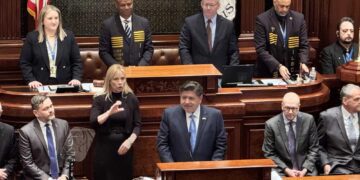SPRINGFIELD – Last week, State Representative Allen Skillicorn (R-East Dundee) filed legislation that would allow debt-ridden municipalities the ability to petition the state to file for Chapter 9 bankruptcy. Through the legislation, House Bill 501, Illinois would become the 25th state to allow municipalities this option as a means to restrain runaway costs to taxpayers.
“If a municipal government becomes so debt-stricken it can’t pay its bills, taxpayers are the ones who end up suffering,” said Skillicorn.
Skillicorn said the proposal essentially follows the same bankruptcy filing process as if a municipality were going through bankruptcy like a person or business. A municipality would have to prove before the court it cannot pay its bills. If it can prove its delinquency, the municipality would have to file a plan according to a court-ordered schedule that divides creditors into classes and proposes treatment for each class. Creditors would get to vote on the plan and the court would approve the plan that has been accepted and is in the best interest of the creditors.
“Although bankruptcy comes with many of its own hazards and should only be considered as a last resort, this option provides an effective path back to financial solvency for a municipality without placing the burden solely the backs of taxpayers,” said Skillicorn.
The process of petitioning the state in the legislation is designed to prevent frivolous bankruptcy filings and to ensure it is only used as a last resort. The proposal also seeks to reassure investors against losses by placing bondholders at the front of the repayment cue in the case of restructuring. This will assure lenders and protect against excessive rate increases for future borrowing requests by municipal governments across the state.
Should House Bill 501 become law, it would provide a much needed avenue to solvency for some of Illinois’ most debt-ridden local government entities, including Chicago Public Schools.
For more information about House Bill 501, visit: http://www.ilga.gov/legislation/BillStatus.asp?DocTypeID=HB&DocNum=501&GAID=14&SessionID=91&LegID=100576.







